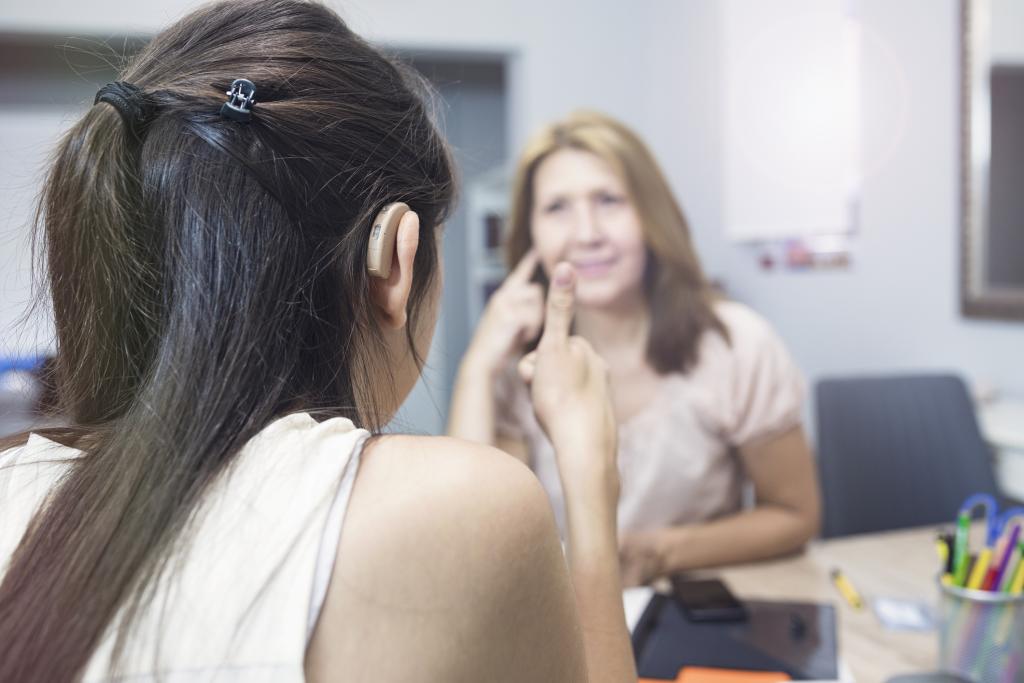
Director Carrie Laws recently wrote for the New Law Journal ( www.newlawjournal.co.uk) about why D/deaf awareness should be considered critical for the legal sector.
Summary
- Explaining the difference between D/deaf and deaf
- Issues faced in the legal system by the D/deaf community
- Measures that can be taken to help the D/deaf community during the legal process
Much has been made of the first D/deaf jurors who were given BSL interpreter support to perform their civic duty. These jurors had three interpreters who rotated every 20 minutes to assist them. They also received the full support of the judge and HM Courts and Tribunals Service staff during their service.
This is indeed a milestone, and great news. But to me it highlights the issue of how our legal system in general is still not offering anything like appropriate support to clients and service users with hearing loss.
This is not a minority group; in fact, it is estimated that there are 8.7 million people with hearing loss in the UK. Let’s look first at the difference between Deaf and deaf. In legal correspondence when the word deaf is written, it could well be being used out of context. Here’s why:
- D/deaf is someone who culturally identifies as being Deaf. They are often Deaf from birth and their first language is BSL – BSL interpreters are their preferred communication support. The capital ‘D’ is used to demonstrate their campaign for cultural and language recognition.
- deaf refers to someone who has some hearing, often assisted with, for example, a hearing aid. Their deafness usually occurs late in life. English is their first or preferred language. They may sign a bit and try to lip read.
Crucially, while members of the D/deaf community recognise their differences this does not give anyone the right to make them feel like a lesser person. Feeling sorry for a D/deaf person does not help them, in fact it denigrates the person that they are by inferring there is something wrong with them. Ever said or heard the phrases ‘deaf as a post’, ‘stone deaf’, ‘deaf and dumb’? These could be perceived as negative, offensive, or downright insulting.
Over the last 12 months The Family Law Company Lawyers have acted for families across our county who are D/deaf. We have seen first-hand just how many barriers they have faced, often purely due to a lack of awareness of what it means to be D/deaf.
Barriers faced by the D/deaf community is tantamount to not getting access to justice. Just as legal aid is there for clients without the financial means to access justice, there should be equal focus on providing support for D/deaf clients to access justice.
So, what are examples of these barriers?
Issues faced by the D/deaf community in the legal system
There are very few signers available to work in the court – but even worse, there are just two D/deaf intermediaries in the whole of England and Wales. Two. Their skills as intermediaries are vital to the client’s understanding of discussions in court.
Think about going through security into court. How does a D/deaf person understand that they are being asked to take off their belt or that their bag needs to be searched? There is nothing visual to explain the process.
In the court room, if you do manage to get an intermediary the court needs to be set out so the intermediary can see the client, the lawyer, the judge, the signer. Ushers currently do not have an understanding of the needs of a D/deaf person in court.
In one of my own care cases, when the parents, who are both D/deaf, were initially served, they were told to find a solicitor themselves and not given any help with this. There is no guidance on law firms that are D/deaf friendly. While they did receive support from an independent advocate from RNID this was only at child protection stage. Elsewhere, they had to engage with independent advocates themselves.
A general lack of awareness
In this same case, the foster carers sent a child to contact with a game to play – the Pie Face game. Although no doubt well intentioned, this game is not suitable for someone who cannot hear or lip read, and the parent couldn’t join in. Instead, they just sat and watched, removing much of the benefit of the contact session. This thoughtlessness could have been avoided if the foster carer had undertaken D/deaf awareness training.
Interestingly in this same family, the first language for the (hearing) children is BSL too. There is no recognition of this, the assumption is that English is their first language, where in fact it’s their second language. However, the expectation from the LA, school, police, and other agencies is that the parents should be able to read in their second language, English. That is like asking me to read a document in Mandarin.
There’s also little awareness that D/deaf people may have cognitive difficulties and the way they process information is different to a hearing person. Patience, understanding – and giving space and time is essential.
Likewise, BSL is a physical way of communicating using the whole body – it can be exhausting, and plenty of breaks are needed. Which is why BSL interpreters supporting D/deaf jurors rotate every 20 minutes.
Few people are aware of the fact that BSL includes regional dialects as most people assume that sign language is a set way of communicating. Independent source of news analysis and informed comment The Conversation conducted in depth research into this – they found around seventeen different signs for ‘purple’. The word ‘people’ is signed differently in Hull, London, and Birmingham, and the number 10 is signed differently in London, Birmingham, and Manchester.
How can issues be addressed and accessibility improved?
The reality is that changes don’t have to be complex. There are simple things that could be easily adapted; for example, the type of games supplied at child contact meetings or consistently recognising BSL as the first language, and consistent use of D/deaf in correspondence.
Deaf awareness training is easily accessible and can be tailored to the legal world. These are just some examples of simple initiatives to implement and behaviours to change. In court:
- Court security could learn basic BSL – or at the very least clear photographic images of the security process should be available.
- Facing the D/deaf person, speaking and not shouting, not over-exaggerating the mouth movements but clearly enunciating words, and keeping your hands away from your face are all really basic but often overlooked ways of making yourself more accessible to the D/deaf person in front of you.
- With fairly simple training, ushers would understand how to set up a court so the intermediary can see everyone they need to see. It’s crucial to ensure that the light is right to avoid casting shadows over the faces of those present.
- Hearing loops should be available – and their availability made clear visually.
- In fact, in an ideal world, ushers, clerks, judges and everyone involved in the court process would all benefit from mandatory D/deaf awareness training, to understand what barriers D/deaf people come up against and how they can be supported.
In general:
- Language matters. Any written documentation must be translated into BSL – as would be the case for any other client for whom English is a second language.
- Too often, D/deaf people are viewed as looking angry or threatening when they communicate because they use their entire body when communicating through BSL. It is imperative not to misconstrue a D/deaf person’s body language.
- The same principle applies to text or email communication – sentence structure is very different in BSL and as a result, text or email communication can be misread as angry, rude, or challenging when that is not how it is intended.
The Family Law Company feels passionately about the lack of understanding of the many issues faced by the D/deaf in the legal system. We continue to campaign on this matter whilst developing our own response and implementing change in our processes.
In Plymouth, where my office is based, we have a large D/deaf community. After our own experiences we took action and hosted a D/deaf awareness training session. This was supported by a local organisation, Living Options Devon, whose D/deaf-led team services include advocacy for D/deaf people, D/deaf counselling, D/deaf awareness & BSL training, D/deaf Get Active & Volunteer and Time to Talk campaigns. Over forty professionals from the region attended, learning about issues such as correct terminology, D/deaf culture, D/deaf social models and communication tips.
Following on from this training, our ‘first impressions’ reception team will all learn basic BSL so when a D/deaf client arrives they will be made comfortable, offered a drink, and invited to sit down. This is the most basic of training but will help support clients at what is a highly emotional and challenging time. It is simple, but it is a start. We plan to roll out further sessions to more people across the region.
Much like the dementia friendly campaign, perhaps it is time for a D/deaf friendly campaign, at least within the legal sector. Access to justice must be for all, and so it must be accessible.
Need some advice? Get in touch today
"*" indicates required fields
The information submitted here is used and stored for the purpose of replying to the enquiry. For more information on how we process data please visit our Privacy Policy.











